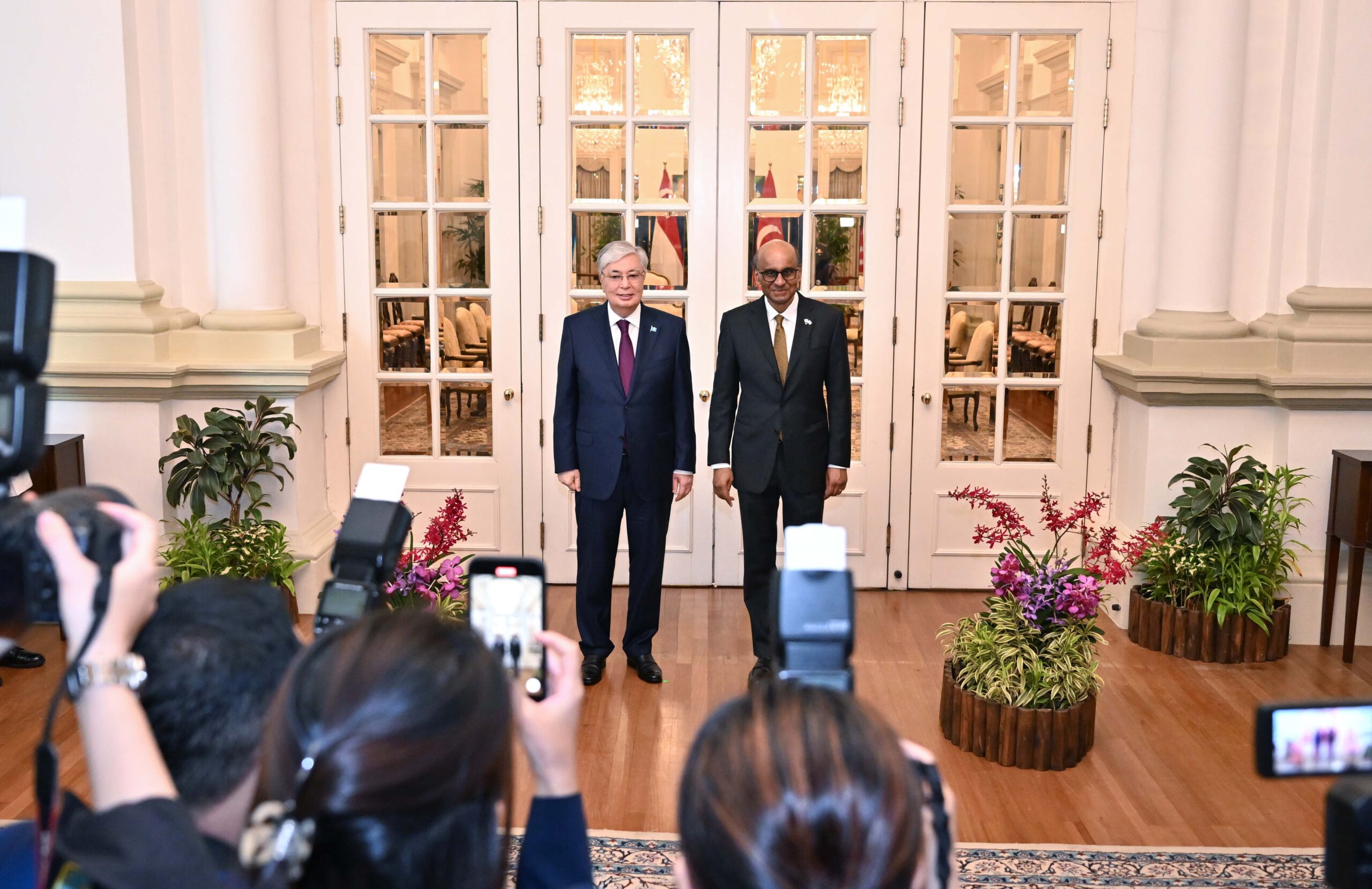ASTANA – Kazakhstan, as Central Asia’s most prosperous country, serves as a gateway to the region, President of Singapore Tharman Shanmugaratnam wrote on his LinkedIn page on May 24, following Kazakh President Kassym-Jomart Tokayev’s state visit.

Kassym-Jomart Tokayev with Tharman Shanmugaratnam. Photo credit: Akorda
According to Shanmugaratnam, Kazakhstan and Singapore share a common interest in fostering cohesive, multiethnic, and multireligious societies. Both countries also promote cooperation to address climate change and transit to a sustainable planet.
Rising economic cooperation
Economic cooperation is on the rise, with a growing presence of Singaporian companies in Kazakhstan. The country is diversifying and reforming its economy, creating trade opportunities via the Trans-Caspian International Transport Route from China to Western Asia through the Caspian Sea.
Shanmugaratnam “much welcomed” Air Astana national flagship carrier’s plans to launch direct flights between the countries, noting that this would help more Singaporeans and their businesses explore what Kazakhstan offers and vice versa.
High competence in foreign policy
In an interview with Kazinform, political scientist Eduard Poletayev commented on Tokayev’s address at the 46th Singapore lecture, stating that not every president can deliver a lecture on such an authoritative platform, as it requires high competence in foreign policy.
“It is one thing to read something from a piece of paper; it is another to clearly understand your country, have the ability to define goals, and find the necessary means to achieve the desired results,” he added.
The lecture went far beyond the scope of official protocols, routine compliments, and necessary conventions, aiming to convey Kazakhstan’s position and understanding of the global situation.
According to Poletayev, it is vital that Tokayev mentions Kazakhstan’s inclusion among the world’s middle powers, noting that in terms of foreign policy, the country can safely be classified not only as a second-tier power but also as a first-tier one.
“In fact, Kazakhstan is in some ways a first-world country and in other ways, perhaps, a third-world country. Countries try to demonstrate superpowers and dictate what other states should do. This is all quite difficult, and Tokayev addresses this in his lecture,” the expert said.
Kazakhstan’s Middle Power status
Political scientist Burikhan Nurmukhamedov opined that Tokayev raised the issue of the middle powers’ role in the international security system and relations by no coincidence. This year, the German Institute for International and Security Affairs determined Kazakhstan as a middle power for the first time. The middle power status means that with relatively small economic, military, and cultural potential, the state demonstrates sustainable development and can impact neighboring regional countries.
Nurmukhamedov stated that the President outlined objective trends that can lead to irreparable consequences. In this regard, Tokayev necessitated reforming the United Nations (UN) and involving middle powers in the composition of the UN Security Council’s permanent members to ensure their perspectives are also taken into account when making decisions that affect many states.
The expert also stressed the strategic significance of delivering the speech in Singapore, a central hub in Southeast Asia with around 60-70% concentration of the global population. He suggested that Tokayev’s proposals should resonate with UN members from this influential region.
A new level of international positioning
Andrey Chebotaryov, director of the Alternativa Center for Contemporary Studies, stressed the importance of updating Kazakhstan’s Foreign Policy Concept following Tokayev’s instructions. He advocated positioning Kazakhstan as a model nation, emphasizing its nuclear-free status and policies to ensure interethnic and interfaith harmony.
Chebotaryov also proposed presenting Kazakhstan as a proactive country that generates important ideas and initiatives and sets trends of a regional and global nature. He suggested enhancing the principle of partnership, highlighting Kazakhstan as a reliable and responsible participant in foreign economic relations.
“In general, in the process of revising key official documents that determine Kazakhstan’s further development and the implementation of its foreign policy course, it is imperative to reach a qualitatively new level of positioning Kazakhstan in the international arena,” Chebotaryov said, concluding that it is not only crucial to compare Kazakhstan with certain countries but also to convince that other nations should compare themselves to the country.

